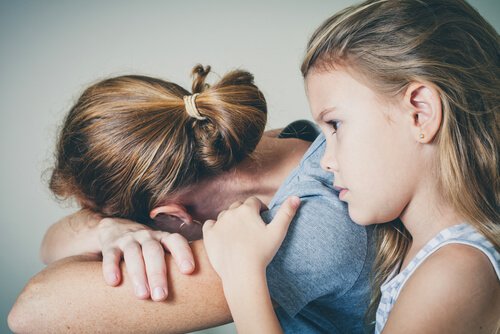(Science Daily) Kids who believe comments like this — assuming blame for their mom’s sadness or depression — are more likely to face depression and anxiety themselves, a new study led by SMU has found.
Related Scientists Say Screentime Is Making Kids Lazy, Crazy And Unhealthy
by Staff Writer, March 11th, 2020
“Although mothers with higher levels of depressive symptoms face increased risk that their children will also experience symptoms of depression and anxiety, our study showed that this was not the case for all children,” said SMU family psychologist and lead author Chrystyna Kouros. “Rather, it was those children who felt they were to blame for their mother’s sadness or depression…that had higher levels of internalizing symptoms.”
In light of the findings, Kouros said it’s critical that parents and others who regularly interact with children pay close attention to the kinds of comments that kids make about their mom’s symptoms and to intervene if children incorrectly think that it’s their fault that their mom is depressed. Children who take on this blame can benefit from therapies and interventions that target negative thoughts, said Kouros, SMU associate professor of psychology.
Sharyl E. Wee and Chelsea N. Carson, graduate students at SMU, and Naomi Ekas, an associate professor of psychology at Texas Christian University, also contributed to the study, which was published in the Journal of Family Psychology.
The study is based on surveys taken by 129 mothers and their children, who were recruited from the Dallas-Fort Worth community through schools, flyers and online advertisements. On average, children included in the study were 13 years old.
Moms were asked to agree or disagree to 20 statements like “I could not shake off the blues” and “I lost interest in my usual activities” to assess if they had depressive symptoms, even if they had not actually been diagnosed with depression. Nearly 12 percent of the women surveyed were found to have potential clinical levels of depressive symptoms.
The moms were also asked to assess whether they felt their children had symptoms of depression and anxiety.
Kids, meanwhile, were asked to complete a total of four surveys to see if they were dealing with any anxiety or depression and whether they blamed themselves for any signs of depression in their mothers.
Kouros said there are two likely explanations for the linkage between mothers’ depressive symptoms and kids’ own mental health issues:
“If children blame themselves for their mothers’ depressive symptoms, then they may be more likely to brood about their mother’s symptoms. And we know from an extensive body of research that rumination over stressors — especially ones that are uncontrollable — is linked with depression and anxiety,” Kouros said. “Also, if children feel personally responsible for their mothers’ symptoms, they may try to ‘make it better’ and use ineffective coping strategies. This could lead to a sense of helplessness, failure, and low self-worth in the child, since ultimately the child was misattributing the cause of their mothers’ depressive symptoms.”
More studies are needed to see if depressed dads have the same effect on their children, Kouros said.
Stillness in the Storm Editor: Why did we post this?
The news is important to all people because it is where we come to know new things about the world, which leads to the development of more life goals that lead to life wisdom. The news also serves as a social connection tool, as we tend to relate to those who know about and believe the things we do. With the power of an open truth-seeking mind in hand, the individual can grow wise and the collective can prosper.
– Justin
Not sure how to make sense of this? Want to learn how to discern like a pro? Read this essential guide to discernment, analysis of claims, and understanding the truth in a world of deception: 4 Key Steps of Discernment – Advanced Truth-Seeking Tools.
Stillness in the Storm Editor’s note: Did you find a spelling error or grammatical mistake? Send an email to [email protected], with the error and suggested correction, along with the headline and url. Do you think this article needs an update? Or do you just have some feedback? Send us an email at [email protected]. Thank you for reading.
Source:
https://www.sciencedaily.com/releases/2020/03/200311134913.htm

Leave a Reply